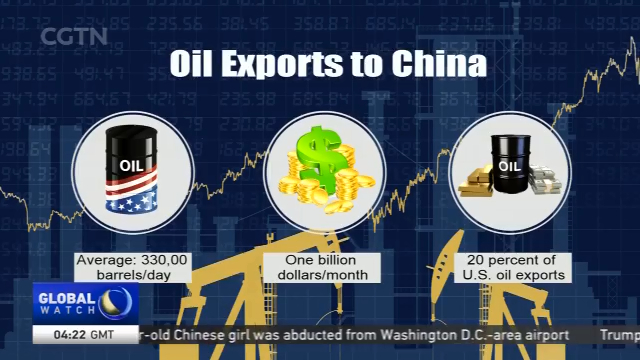
13:40, 03-Aug-2018
China-US Trade Tensions: Tensions could affect US crude oil sales to China
Updated
13:06, 06-Aug-2018
02:30

Meanwhile, China has threatened to impose a 25 percent tariff on US oil if Washington goes ahead with its plan to slap tariffs on more Chinese goods. This comes at a time when the US has been increasing oil shipments to China. Karina Huber has more.
In 2016, the United States began exporting oil for the first time in 40 years. Two years later, China is one of its biggest purchasers. In the first four months of the year, China bought about 330,000 barrels of U.S. oil per day. That's around a billion dollars-worth per month and represents 20 percent of U.S. oil exports. In June, China surpassed Canada to become the biggest buyer. Experts say U.S. output is expected to increase and China will likely consume even more U.S. oil.
MATT SMITH DIRECTOR OF COMMODITY RESEARCH, CLIPPERDATA "The U.S. predominantly exports light sweet crude, which essentially is high quality, low-sulfur crude. That is something that is in demand in China. And their appetite is only going to grow for that, particularly in the North, into those independent refiners."
Chinese buyers have been willing to ship U.S. crude halfway around the world, because it is trading at a discount relative to other global benchmarks like Brent crude.
KARINA HUBER NEW YORK "But if China were to impose a 25 percent tariff on the import of U.S. oil, as it has threatened, that discount would disappear and experts say the market would dry up."
SANDY FIELDEN DIRECTOR OF RESEARCH FOR COMMODITIES AND ENERGY, MORNINGSTAR "Demand in China would drop overnight to zero, I would expect. Nobody is going to pay an extra 17, 18 dollars a barrel for crude just because it's from the US."
Chinese buyers could source light crude from other countries like Nigeria or Russia. Experts are mixed on the impact tariffs might have on U.S. producers.
SANDY FIELDEN DIRECTOR OF RESEARCH FOR COMMODITIES AND ENERGY, MORNINGSTAR "The world crude oil demand isn't going to change because of China's buying policy. So, there will be a home for it. Effectively, if China buys from someone else, then the people that were previously buying from them will need to get it from the U.S. In other words, it balances out."
India has already become a bigger buyer of U.S. crude. But, even if that market grows as Fielden expects, other analysts say U.S. oil producers are unlikely to escape unscathed from a U.S.-China trade war.
MATT SMITH DIRECTOR OF COMMODITY RESEARCH, CLIPPERDATA "There are many different ways that this could play out here. But really it ultimately leaves the U.S. in a fairly tight spot if we see so much of their export demand being taken off the market because of these tariffs."
Karina Huber, CGTN, New York.

SITEMAP
Copyright © 2018 CGTN. Beijing ICP prepared NO.16065310-3
Copyright © 2018 CGTN. Beijing ICP prepared NO.16065310-3